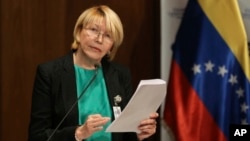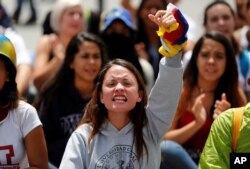Venezuela's chief prosecutor asked the Inter-American Commission on Human Rights for protection Friday, days after the Supreme Court barred her from leaving the country and ordered her bank accounts frozen.
Tensions between Luisa Ortega Diaz and President Nicolas Maduro's socialist administration have been steadily escalating since she contested a Supreme Court decision in late March that dissolved the opposition-controlled National Assembly and sparked a deadly wave of unrest.
Since then, she has become one of the few critical voices within the government — other than the sidelined congress — challenging Maduro's push to rewrite the constitution and pressing charges against officers responsible for deaths during anti-government protests.
Chief of Intelligence Promoted
On Friday, Ortega Diaz's office announced it was summoning the chief of Venezuela's feared Sebin intelligence agency, Gustavo Gonzalez, to appear on suspicion of "committing grave and systemic violations of human rights.''
Prosecutors said they are investigating incidents of illegitimate detentions, arbitrary raids and cases in which people have remained imprisoned despite court orders that they be freed.
Maduro responded hours later by promoting Gonzalez to head the nation's military. He called Gonzalez and Antonio Benavides Torres, another high-ranking official under investigation by the state prosecutor, "brave patriots.''
"They have defended the peace of the republic and have all my support,'' Maduro said.
Gonzalez is the second high-ranking official Maduro has rewarded after being accused of abuses against the opposition this week. On Thursday, the president decorated a colonel seen forcefully pushing the president of the National Assembly.
Turbulent Week
The developments capped perhaps the most turbulent week yet in Ortega Diaz's struggle to assert her office's authority in a country where nearly every branch of the federal government is filled with Maduro allies.
Earlier this week, the government-stacked Supreme Court ruled that a number of responsibilities long the exclusive jurisdiction of the state prosecutor's office would also be assigned to the pro-government public ombudsman's office. The decision was drafted as a rogue police pilot flew a stolen helicopter over the Supreme Court, dropping several grenades and fleeing.
"This is yet another step against the democratic institutions and autonomy of the Venezuelan public prosecutor,'' Diego Garcia Sayan, the United Nation's special investigator on the independence of judges and lawyers, said Friday.
Request for protection
Ortega Diaz announced on Twitter she was seeking the protection of the Inter-American Commission on Human Rights for all workers at the state prosecutor's office, but provided no further details.
The Washington-based body, which is an agency of the Organization of American States, is responsible for protecting human rights throughout the hemisphere. It did not respond to a request for comment.
In recent weeks, Maduro and his allies have stepped up their criticism of the prosecutor.
Vice President Tareck El Aissami told state broadcaster VTV on Friday that Ortega Diaz "acts like a militant for the opposition.'' He said the Supreme Court's restrictions on her movements were warranted.
"They are necessary measures of justice,'' he said.
The National Assembly is the only entity that can remove Ortega Diaz from office under the current constitution, but observers suspect Maduro supporters will try to change that when they draft a new charter.
Ortega Diaz is a longtime supporter of the socialist government installed by the late President Hugo Chavez, whom she frequently quotes in defending positions that run counter to Maduro's own assertions. More recently, however, she has become a thorn in the president's side as he attempts to proceed with a constitution rewrite that she has roundly dismissed.
"I don't recognize these decisions,'' she said this week in denouncing the Supreme Court's move to allow the ombudsman to carry out criminal investigations. "I will defend Venezuela's constitution and democracy even if it costs me my life.''
Relatives threatened, harassed
Ortega Diaz has reported that relatives have been threatened and harassed.
Three months of political upheaval in Venezuela triggered by the March Supreme Court decision have left at least 77 people dead, hundreds injured and thousands detained. On Friday, opposition leaders denounced the detention of more than a dozen student protesters who were loaded into the back of a truck as tear gas launched nearby drifted into the vehicle and the doors were closed.
Students Detained
Student leader Daniel Ascanio said 29 students were detained Thursday for participating in the protests. It was unclear what charges if any they are facing, though Ascanio said some had been able to speak with relatives and appeared "physically well.''
"We are living at a time when the national government detains youths just for expressing our desire for a different country,'' he said.
Demonstrators are demanding new elections, but Maduro has vowed instead to resolve the crisis by convoking a special assembly to rewrite the constitution. The election is slated to take place in late July though polls indicate it has little public support.





